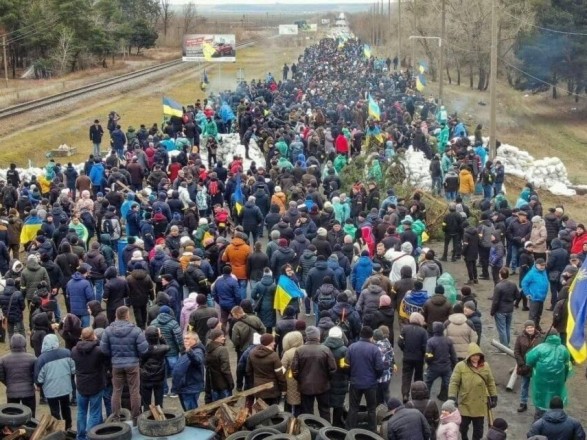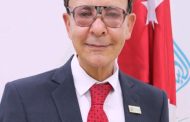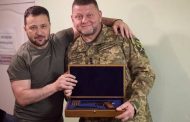They were taken to the industrial zone and interrogated:an activist from Energodar told about his experience of communicating with the occupiers,
KYIV. UkraineGate , 11 , May , 2022 | War News .
Checkpoint in Energodar. Residents came to the defense of the city before the armed assault
Even before the full-scale Russian invasion of Ukraine, Maksym Shcherbyna took an active public position, and when the occupiers came to his native Energodar, he decided that he could not betray himself and renounce his beliefs.
When the occupiers came to Energodar, Maxim was in town.
“Sometime on February 28-29, we arrived at the first checkpoint and decided to start building barricades,” he said.
The example of local activists inspired energy donors – people joined the work when they saw the barricades being erected.
“The next day a lot of people came and joined the work. They began to bring tires, collect sand, make trenches, protective structures. Volunteers brought food to the checkpoint for the boys, who were on duty day and night. Thus, we have local self-defense, which defended. But this is not Troy, but just local people who wanted to defend their territory, ”says Maksym about the days before the occupiers arrived.
According to Maxim, the Russians approached Energodar, but when they saw the anti-tank hedgehogs, they stopped and then even tried to negotiate with the city residents to let them pass. The enemy approached, but did not attack – it lasted several days. Residents of Energodar gathered near the barricades, came with Ukrainian flags. There are really a lot of people, says Maxim. But in early March, one night the Russians tried to storm the city.
“The assault was with weapons, they fired at the checkpoint, they had 3 tanks approaching and firing, and about 100 units of equipment. Someone had a weapon from ours and they were given a fight, shot as much as possible, but with a large group that gathered on their part, the guys had to retreat. When it all started, I was with a child. But when he saw the message and that the mayor urges everyone to come to the checkpoint, he took the child to a safe place and went to the checkpoint. The battle has already begun there. At that time there was an active phase – the enemy’s tank fired at positions. I started the car and started to take people out of the city and save how much the word is used in this situation, ”said the activist.
Then the Russians moved towards the nuclear power plant, but on the way met resistance.
“They were very afraid of everything and fired at the windows, if the curtains swayed, they also fired. It was visible on houses – as they went, and cleaned up perimeter. We have a special unit guarding the power plant there (at the nuclear power plant – ed.), They took the fight. The battle was strong, one tank was lined up. We learned from official sources that there was at least one casualty on their part, a tank commander. The battle was accompanied by gunfire, which lasted until 4-5 am, ”Maxim describes the events that took place in Energodar, when the whole world watched with bated breath as the occupiers fired at the nuclear power plant from a tank.
According to Shcherbina, when the Russians entered the city, many locals left, taking the first opportunity. Maxim himself, who worked as a chief engineer in the health department, could not leave his job, in addition, he suspected that he was on the lists of activists and probably would not be able to cross the checkpoints of the occupiers. But in the city, as it turned out, it was dangerous.
“On March 18, the orcs arrived, reported to the director’s office, and I was not in my office at that time. I was on the territory, and the territory of the medical and sanitary unit is large. There was a call from the director asking him to come to his office. When I went to the office, I already saw that their UAZ was standing and assumed that they might want to meet with me, so if possible I cleaned the phone, deleted everything unnecessary and then went to the office. They were already waiting for me there, a certain Konstantin. The man was in military uniform, pulled the shutter of the pistol and asked to follow him. We passed – he purposefully went to my office. Went to the office. He searched, inspected my belongings, took my phone, then called his partner. He approached with a machine gun and escorted me to the UAZ. Having put in a car I was asked, that I take them to my friend Viktor Buchnev, also the activist they were looking for. They looked at my phone and asked questions. I refused, but I understood that they knew Victor’s address – they saw their cars nearby – and that, most likely, he was no longer at that address. So after receiving a couple of blows, he realized that there was no point in resisting.
We drove to Victor’s house. But continued to sit in the car. They looked at my phone, flipped through photos, checked chats, notebook… In one of the chats, they didn’t like the rhetoric of messages about how locals treated them. They started discussing it with each other, and then there was a phrase that I should be taken to the wasteland and broken. They clarified that quietly. After that, a civilian car pulled up from behind – squeezed from one of the residents of Audi. At first they wanted to put me in this car, but since it was daytime and on the street, they decided to do it elsewhere.
We went to the industrial zone, where I was taken out, shot several times, showing the seriousness of my intentions. Then they took out a knife and started stabbing and cutting off the ears. They demanded that I contact Victor or take him out on them. I refused for a long time, saying that I did not know where he was, that he had disappeared and was not in touch. But they found his father’s number in the phone book. I rarely talked to him and forgot to rename. I was shoved in the mouth and told to call Victor’s father. I was warned that if I gave any signals, the conversation with me would be over on the spot. They put the phone on the speakerphone, dialed, held the phone to my ear and demanded to speak confidently to get on Victor. Victor’s father picked up the phone, but during the conversation I started asking questions about the phone number, and he knew I had all of Victor’s numbers, so he replied that he did not know where he was and that he did not have a number, then hung up. In this way, we managed to avoid merging unnecessary information, ”Maksym said.
The man’s suffering did not end there. He was shoved into the trunk of a car and taken to the forest.
“They put me on my knees there, threatened me with a gun, and started questioning me. They asked if anyone in the city had a weapon or if I was at a checkpoint. I was at the checkpoint, like most citizens, so I confirmed it. They interrogated me for a long time: one of them was filming part of the interrogation on the phone, and the other was flipping through my phone, looking for information, looking at the numbers, checking everything in detail. After the interrogation, they began to say that they wanted peace and good, that if I wanted to live, I needed to cooperate with them. They warned me to leak them information.
Then they put me in the car, took me back to the medical unit, gave me my phone. But before that they showed several articles of the mayor – the text was written in Ukrainian and they asked to translate what was written there.
Then they released me, ”Maksym said.
Shcherbina says that the occupiers sometimes called him to find out, for example, who was present at the rally. This was the case when the first deputy mayor of Energodar, Ivan Samoidyuk, disappeared and people came to a rally in support of him. Then it all ended in a clash with the occupiers.
“At such moments, they called, asked me what was going on, who was there, trying to get information. I included as many fools as possible, saying that I had not seen and did not know, ”explains Maksym.
After the occupiers began searching for the activist who removed and burned the red flag they had hung, Maxim realized that he needed to hide.
“I understood that I was being hooked,” says Shcherbina.
Currently, the situation in the city is difficult. It is almost impossible to deliver humanitarian aid there. All cargoes are carefully inspected by the occupiers. Part of the humanitarian aid passes through the crisis center in Zaporizhia, through NNEGC Energoatom, but everything is controlled and there have even been cases when the occupiers took away the Ukrainian humanitarian woman and distributed her to the citizens on their own behalf.
Most of the residents left the city, mostly NPP employees, as well as those who are afraid to leave and do not know if they will be able to settle in the new place.
“Recently there was a meeting with the heads of condominiums. They gathered the heads of apartment buildings and warned that people should pay for the services of the heating system in cash, but there is a nuance that banks in the city do not work and many run out of cash. That is, there is money on the cards, but practically no money. Through their people, collaborators, protégés, they began to offer services for the transfer of cash at interest. 10% was voiced. But in chats they write about 20%, ”says Maksym about the situation in the city.
Most shops in the city are closed. Some entrepreneurs are probably smuggling food. But the occupiers offered local businesses a “green corridor” to the Crimea to buy goods on the occupied peninsula. Maxim notes that some stores have begun to take rubles.
Source: Ukrgate







